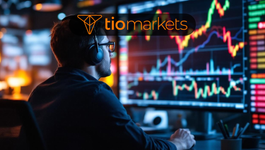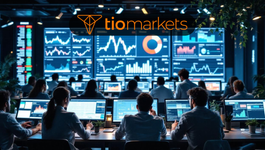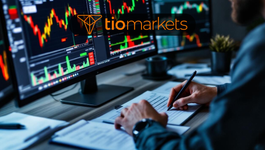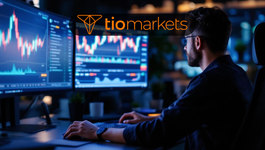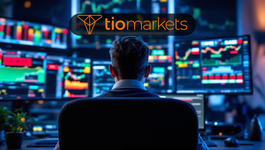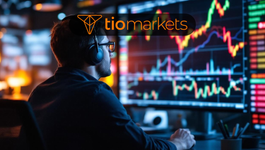Indices vs Forex trading: The differences and what to trade?
BY Chris Andreou
|fevereiro 28, 2022You’re probably wondering where to start. Many people find themselves in your shoes and one of the big decisions you have to make is what to trade. Indices vs forex trading, it can be quite intimidating to figure out. Apart from all the information out there, the two markets are constantly shifting, making it quite hard.
Forex and Indices trading have one thing in common: they’re both markets where buyers and sellers come together. You probably already know that but even if you want to trade in both markets, it would be helpful to know which one you should focus on.
In this article, we will be taking an in-depth look at both and compare the pros and cons along the way.
So if you are curious to learn more, keep reading and we will get started.
Create your demo account on the popular MT4 or MT5 trading platforms to practice trading in the indices and forex markets.
Indices vs Forex trading market comparison
When you ask experienced traders where you should begin, their first thought is to recommend something they know. If you’re new to trading, it can be difficult to know if their recommendation is right for you. However, bear in mind you don’t have to choose between markets – you can trade both of them. As long as you understand how each one works, you’ll be able to trade either of them successfully.
But what market should you trade if you had to pick one? There really isn’t a right or wrong answer; it just depends on your preferences as a trader. So let’s begin with an explanation about each of them.
What is forex trading?
Forex trading is popular because it is a globally available 24/5 market that allows anyone to trade. With about $6 trillion in daily trading volume, it is the largest and most liquid market in the world. There are plenty of opportunities for you to trade in the forex market.
There are also many more reasons why people choose to trade forex.
It is also a leveraged product, which means you can buy or sell currencies of a larger value by only committing a small amount of capital.
Forex trading involves trading currencies in pairs, where one currency is exchanged for another. The profit or loss comes from converting and buying back the original currency.
What is indices trading?
Trading indices is a way to speculate on the movements of an entire share index or sector, rather than just single stocks. Trading indices means you don’t need to hold shares of individual companies, like Apple or Amazon. Instead, you can make investments based on your view of how well a group of companies will perform.
The stock market is a dynamic and diverse marketplace with thousands of different stocks to choose from. Indices trading are a great way to invest in the broader stock-market sectors, and it is an opportunity for investors to diversify their portfolio.
Also, since indices are made up of many constituent stocks, they are generally more stable than individual stocks, so they can be a good place to start when you first begin trading.
Companies vs countries (or indices vs forex)
The main difference between forex and indices trading is that whilst forex traders are speculating on currency strength, indices traders are speculating on companies’ performances through price movements of an index
When trading currencies, you would buy a currency pair if you believed that the base currency will strengthen against the counter currency, or the quote currency will weaken against the base currency. For example, if you believed that EUR will appreciate against the USD, you would buy the EUR/USD. The value of each currency fluctuates based on many economic factors. Traders buy or sell the relative strength or weakness between them accordingly.
For indices trading, you would buy or sell a group of stocks that are listed on an exchange and trade them as a unit. For example, the FTSE 100 Index is a list of the 100 largest companies listed on the London Stock Exchange (LSE). The value of an individual share in one of these companies can go up or down depending on many factors. When they do, they affect the price of the FTSE 100 as a collective.
Indices traders buy or sell an index if they think its price will rise or fall over time depending on the performances of the companies that make up that index.
The instruments available for indices vs forex trading
In the Forex market, currencies are divided into three main categories. Which are the majors, the minors or cross currencies and the exotics.
Forex currency pairs
The majors include the Euro (EURUSD), the Japanese Yen (USDJPY), the Great British Pound (GBPUSD) and the Swiss Franc (USDCHF). This group involves major currencies traded against the US Dollar. The Canadian Dollar (USDCAD), the Australian Dollar (AUDUSD) and the New Zealand Dollar (NZDUSD) are also major currencies but their values are significantly influenced by commodity prices.
The minors or the cross currency group is all the major currencies crossed with each other and don’t include the US Dollar. For example, the cross currency group includes EURAUD, EURGBP and the CHFJPY.
This just leaves the exotics; this group of currencies are traded less often than the others. The currencies involved usually belong to developing nations, like the Mexican Peso (MXN) and the South African Rand (ZAR)
Indices available for trading
When trading indices, there are fewer instruments available for trading and naturally will have a narrower focus. These include;
The Dow Jones industrial averages, S&P 500 and the Nasdaq. These three indices are the most widely followed stock indices from the US. The constituent stocks are some of the largest and most well-known companies in the world.
Then there are the top Indices from Europe, which includes the German DAX, the FTSE 100 for the United Kingdom and the Spain stock market index, the ES35.
And lastly, there is the Japanese Nikkei which constitutes the top 225 listed on the Tokyo stock exchange. The Hang Seng index for companies listed on the Hong Kong stock exchange. And the ASX200 index, which is the main indices for Australia.
There are many more but these are the indices available to trade on TIOmarkets trading platform.
Trading these indices gives you exposure to the broader stock markets performance for the respective region. It is also very easy and affordable to get involved, due to the high amounts of leverage and low transaction fees.
The costs involved with Indices and forex trading
It’s worth noting that there are a few fees involved with trading, such as transaction and financing costs (overnight and weekends). But the ones outlined below are the main ones to be aware of when you start trading.
The main cost of trading is the spread, plus a separate fixed commission depending on the account type. The spread is the difference between the BID and ASK price and both the indices and forex markets have spreads. This is normally a variable number of points or pips. It can be as low as 0.2 and will vary depending on the Indices and currency pair.
Generally speaking, the more popular or liquid an asset is, the tighter the spread. Assets that are more volatile generally have wider spreads and forex usually has tighter spreads compared to indices. Further to the spread, there is a fixed commission and that depends on the account type.
Then at the end of each trading day (5pm New York time), any positions held in your account may be subject to a swap or roll-over fee, depending on what you bought or sold and the quantity. The Forex swap fee is calculated based on the interest rate differentials between currencies. You can get more information about this from the contract specification inside the trading platform or see it in action on a demo account.
The differences in leverage, volatility and liquidity
Both the indices and forex markets can be traded using leverage, which means you can trade larger amounts with a relatively small amount of money up front. However, there is a difference between the amounts of leverage available for indices vs forex trading.
For indices trading, the amount of leverage available is usually up to 1:20. This means that for every $1 in your trading account, you can buy assets 20 times greater.
When it comes to forex trading, the amount of leverage available can go up to 1:500. The reason why forex has higher amounts of leverage is because the amounts needed to trade in are generally higher to make it feasible. With that said, trading using leverage increases the risk of losing money rapidly. It depends on the quantities being traded and the price volatility of the asset.
Indices are generally more volatile than Forex but some currency pairs are more volatile than others, just like indices. Furthermore, both markets are very liquid so it is easy to buy and sell or get in and out of your position. However, forex is superior in this regard; it is the largest and most liquid market in the world.
What affects indices and forex prices
As with any market, certain factors will affect currency exchange rates. Here are the top price-determining factors for each asset class.
In forex trading, the top factors that affect the forex market are interest rates, gross domestic product, inflation, consumer confidence and employment data. Generally speaking, when a countries economy is doing well, its currency will strengthen. And when it isn’t doing so well, the currency will tend to weaken relative to others.
For indices trading, there is some overlap with forex on the factors that affect pricing. Since when a countries economy is doing well, it means companies are generally doing well too. The main factors that affect indices prices are the same as the factors that affect stock prices. Remember that indices track the performance of a basket of stocks.
The top factors that affect indices prices include company earnings, dividend pay-outs, mergers and acquisitions, hiring or redundancies and new product announcements.
It can be quite difficult keeping track of the constituent stocks that make up an index. So forex trading can be much simpler due to economic data being easily accessible.
Conclusion – What to trade?
Alright, so what is the final verdict and which one should you focus on. Really, it depends, you can trade both markets on TIOmarkets trading platform. Sometimes, economic and geo-political conditions will provide better opportunities in one market, compared to the other.
With that said; if you are more interested in trading relative value and comparing countries against each other, then forex is the one for you. If you prefer the economic activity of companies or sectors, then indices is the better option. Even though there is some overlap in the factors that affect prices for each market, forex might be easier to keep track of because it has a narrower focus.
Indices are generally more volatile than currency pairs, so if you have a tighter budget, then forex might be a better place to start. You should try trading in both markets for a period of time and then go with what suits your trading style and risk tolerance the most.
Take your knowledge further with TIOmarkets
This is where education meets excellence, take your knowledge further with our suite of educational resources and sign up to our free forex trading course. Then put your knowledge to the test on a demo or live trading account.
With TIOmarkets, you can trade more than 300+ instruments in the forex, indices, stocks, commodities and futures markets, all with low fees and fast order execution speeds.
Whether you are a beginner or experienced traders, we are committed to providing you with 24/7 customer support and the tools you need to trade effectively.
Register your account with TIOmarkets today.

Risk disclaimer: CFDs are complex instruments and come with a high risk of losing money rapidly due to leverage. You should consider whether you understand how CFDs work and whether you can afford to take the high risk of losing your money. Never deposit more than you are prepared to lose. Professional client’s losses can exceed their deposit. Please see our risk warning policy and seek independent professional advice if you do not fully understand. This information is not directed or intended for distribution to or use by residents of certain countries/jurisdictions including, but not limited to, USA & OFAC. The Company holds the right to alter the aforementioned list of countries at its own discretion.
Join us on social media

Experienced independent trader
Related Posts
